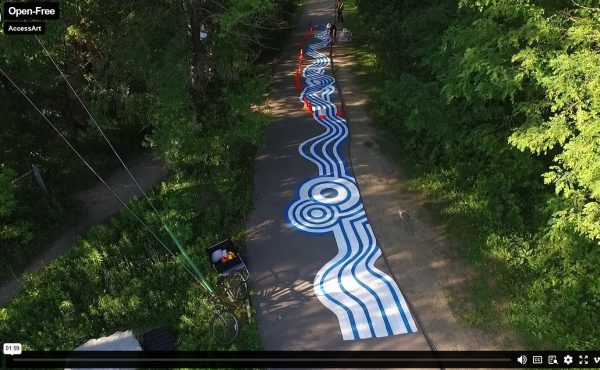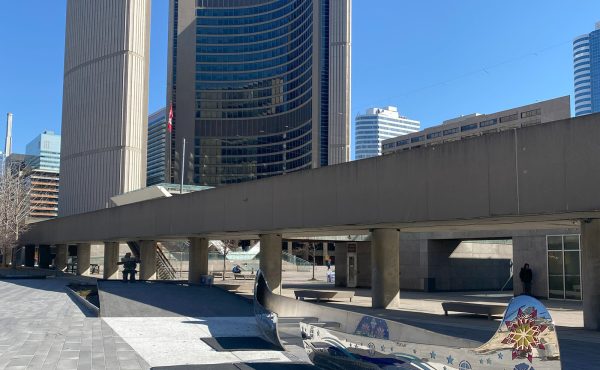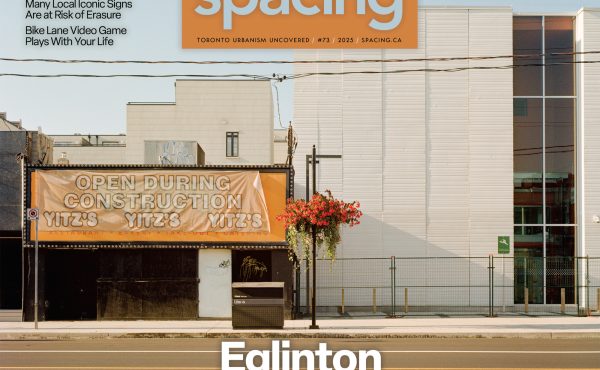
It was exciting to read today that Mayor Miller is sending councillor Brian Ashton to London to study congestion charges. If you remember back in the election, Miller seemed to back off his stance on road tolls, while our election columnist John Lorinc was all over the idea of road tolls/pricing (read his columns on the topic here, here, here, here, and here). I think Miller made some valid points on the campaign trail: while it makes sense to implement road pricing, Toronto doesn’t offer the transit service options that allow people to get out of their cars and easily transition into public transit. London, on the other hand, has an extensive network of subways that make a congestion charge easily for people to adjust to. But that can be refuted somewhat, too: I spent time in Stockholm, Sweden this summer where a congestion toll was introduced on a six-month trial basis. It was widely unpopular when unveiled, but when it was put to a referendum in September 2006 the tolls won out by 55% to 44%. Stockholm has a population about half the size of Toronto and a subway system that’s not nearly as extensive.
Councillors Gord Perks and Adam Vaughan have offered up other ideas instead of road tolls. Perks has mentioned charging drivers a fee when they renew their licenses based on the amount of kilometres their vehicle has been driven since the last renewal process (I picture a spate of Ferris Bueller-type senarios where folks are trying to reverse their odometre). Vaughan suggested charging extra fees for larger vehicles that use the street parking permits: if you have an SUV your permit costs more than, say, a Honda Civic or a Toyota Prius.
What are your thoughts on this?
From today’s Toronto Star:
Miller has distanced himself from talk of a similar tax here, but Councillor Brian Ashton, Miller’s pick to head council’s planning and transportation committee and one of council’s picks for the Greater Toronto Transit Authority, says Toronto has to keep its options open.
“We have to get more juice out of the transportation lemon in Toronto,” Ashton told the Star. “London’s taken some comprehensive approaches. They’re often heralded as the one major city that’s introduced congestion taxes.” Ashton said he’s to be briefed on the congestion tax by London’s deputy mayor.
“I want to learn about the congestion tax. Why was the public accepting of it? What was the level of congestion that triggered the need for that type of tax? We think we have congestion here but maybe we haven’t reached that level yet.”
Environmentalist David Suzuki last week raised the issue of a congestion tax in a meeting with Miller and city councillors, while GTTA chair Rob MacIsaac has made similar comments.
“London has a congestion pricing system that is reporting great success,” MacIsaac told a transportation panel last month. “You want to bring your car downtown, you pay for the privilege. Will we be discussing that? Absolutely. We’d be foolish not to look at it.”
Ashton said yesterday the GTTA wouldn’t be doing its job if it didn’t look at congestion taxes, road tolls and other so-called road-pricing measures.
“Even automobile drivers know that there’s a crisis coming,” he said.




16 comments
I still have trouble with Toronto doesn’t offer the transit service options that allow people to get out of their cars and easily transition into public transit. – this may be true for the city as a whole, but the downtown core? Anywhere near the Yonge-University subway loop would be perfect for a congestion charge because a transit alternative is already readily available.
Wouldn’t it make sense to charge drivers entering the downtown core for now, using the money to increase transit service outside the core and expand the congestion charge zone accordingly?
That’s exactly what London is doing – it only charged for the very center of the city, funnelling the money into transit… and now that transit outside that center is more reliable and extensive, they are extending the zone.
I would also suggest calling it a “Congestion User Fee” rather than a tax. “User Fee” is MUCH more politically attractive.
All good, but even as a non-driver, it is not fair to expect the TTC to work even further beyond the capacity it is at now. The tolls should be incremental, on a clear and publicized schedule, and the TTC/GO improvements should be a step ahead of that, and… start this process immediately and bring it to completion in fewer than ten years. Nothing like the fifty-year time plan of inaction of the original Tory climate plan.
I think tolls are perfectly justified in cities like New York or London where the subways and transit system in general are so extensive that you can get pretty much anywhere, fairly reliably. If we are expected to pay tolls in Toronto then there has to be a viable alternative to driving in place. Currently, the TTC is sadly underfunded and would not even be able to handle the sudden additional hundreds of passengers diverting to transit due to tolls. As it is during afternoon rush hour it is not uncommon to have to wait for 2 or 3 or 4 trains to pass before getting one empty enough for riders to sardine themselves in. What’s the point of a toll if the infrastructure is not there to handle the consequences. First fix transit, then tax or charge drivers.
This idea hardly seems fair. If you live in North York or South Etobicoke, then you’re not too far from several subway stations. People in Scarborough, or the northern portions of Etobicoke get shafted when it comes to public transit though.
joe> the road toll argument about toronto’s lack of transit options is about the suburbs, not downtown. there are plenty of areas in the GTA right now that are not well connected to the subway system, particularly if there was a big increase in ridership spurred by road tolls. at very least, there would have to be a big expansion of paid parking facilities at the outlying subway stations to serve people who will have to drive the first leg, and then take the subway. even if the congestion zone is limited to the downtown core, it’s the outlying areas which will see much of the impact from changing commuting patterns. there’s just no way to provide that kind of parking volume close to the core. redesigning outlying stations to accomodate this kind of traffic will be challenging. still, it sounds like a good idea to me. and the paid parking would combine with congestion tolls to help finance expanding the transit network. the economic concern is that it would drive even more businesses out to the burbs.
” and now that transit outside that center is more reliable and extensive, they are extending the zone.”
I am for the congestion charge but when I was in London last year I found a lot of different views on whether it was working or not. Whether public transit has improved seems to depend on who you talk to. I wouldnt say that the extension of the zone was due to improved public transit around the existing zone either; there was a lot of local pressure from residents of Kensington and Chelsea to be included.
London Travel Watch (an indepedent public transit group) is not so sure that the extension (at least as one large zone) was a good idea; they would rather see zones. There is also concern that by making one larger zone, congestion will actually start to increase as more downtowners can drive across the downtown area. It should also be noted that the hours that the congestion charge is in effect were reduced.
London is is learning the hard way by trial and error and hopefully everybody else will benefit from their experience.
I have nothing against the toll idea, but I agree with Miller’s election statements that Toronto simply does not have the mass transit to pull it off well. New York, London, Paris or even Chicago could do this tomorrow (or in the case of London a few years ago), but the TTC and GO would need massive improvements in service to make it feasible for people to get downtown.
While both Perks’ and Vaughan’s policy suggestions are both valid. I’m concerned that neither of them properly address the issue around driving. Many drivers drive because it appears to be cheap, there is no every use user charge like there is for the TTC. Sure drivers may hundreds of thousands of dollars for the car, the gas, the insurance, parking, and other costs…yet there is little connection that driving=expensive. I would recommend tolls on all highways in the GTA, not just the Gardiner, DVP and 407, to hammer this point home.
Regarding (lack of) transit options, it likely refers to capacity of the system. There are a lot of overcrowded streetcar and bus routes. In the film Contested Streets, shown by TPSC (Streets to Screens) last fall, it was noted that London added capacity to the surface routes to coincide with the congestion charge.
All highways in the GTA are a “premium” service that should command a premium price to use.
Highways are a premium since they are rights-of-ways that provide faster access than the alternative of travelling via local streets.
Why not charge premium prices the same way that we charge for premium parking on major streets and in lots and not farther away?
..
If Toronto doesn’t have the political courage to charge premium prices on its highways (and/or inner-city roads) it should reduce the supply of free roadways by shifting lanes of highways and roads to exclusive use by transit.
Under this scenario, the “toll” is the added time it would take to travel around the city with less of its road service freely allocated to cars.
This would apease those who fear that tolls would generate increased demand for transit in excess of what can be supplied with the existing capacity; transit would gain additional capacity by having more surface roadways uncluttered with cars for streetcars and busses to do their round trips faster.
..
Funny how the argument that there are too few alternative options is brought up only in the context of road tolls and not in the context of rising TTC fares.
TTC riders are likely as captive an audience as are car drivers. There will be some change in demand with higher prices, but overall most people will still drive with road tolls just as most Torontonians put up with higher TTC fares that are never tied to better service.
I think this is what makes drivers really nervous about the thought of introducing highway and inner-city tolls: drivers will pay up and still drive, thus providing a reliable source of revenue!
Sooner or later, it will become apparent to politicians (if the roads are public) or private companies (e.g. 407ETR) that they can increase tolls in excess of inflation and people will still pay them, just as students still go to university in spite of rising tuition.
What do you mean by “extensive”?
Wikipedia: The Stockholm Metro, or Stockholms tunnelbana, is the metro system in Stockholm, Sweden. The system has three main lines and one hundred stations, 47 of which are subterranean and 53 are aboveground (surface and elevated) stations.
Stockholm has 143km of rails.
Toronto has 69 stations, and only 68.3 km of rails.
However, I still do agree, that money for transit would be nice. And I would like to take this time to voice my support for eliminating streetside parking on Queen St. in favor of making the streetcar lane car-free during the day like on King St. That is all 🙂
Well, I guess any congestion charges will have to be in excess of $25 a day, because that’s what this city now charges anybody who wants to park his car and walk or take public transit in the downtown core.
Oh, by the way, drivers have been paying to upgrade public transit for motorists, in the form of added gas taxes, added license fees, added plate fees, added parking fees etc. Don’t blame the motorists if none of the money they shell out ever seems to get to the TTC…
What Sue doesn’t seem to know is that all those revenue sources go to the Feds or the Province except for parking fees – yet Toronto is responsible for the upkeep of all roads – even the highways. The fact is that every Torontonian pays for the maintenance of our roads through property taxes (either directly through tax, or indirectly through landlords)… yet one group of Torontonians and GTA-ers have a virtual monopoly on the use of these roads – the drivers.
It makes sense to charge drivers with a User Fee if they are driving somewhere that has adequate transit, like the downtown core.
Joe, I’m well aware that federal and provincial taxes and “user fees” go straight into federal and provincial government coffers. I also remember that successive federal and provincial governments ahd all promised that this revenue would be redistributed back to the municipalities for transit funding and other greener alternatives to automobiles.
If you re-read my post, I’m pointing out that this huge sum of money never seems to come back to local transit authorities, as had been promised.
And I’m implying, apparently too subtly, that if the city starts collecting congestion fees from motorists, somehow that money will also fail to find its way to expanding the TTC.
I totally support the idea of a congestion tax… also… sure Toronto doesn’t have the best transit system… that’s why you start the fee out super low… say $2.50 per day or something… voila some extra transit funding… without taking too too many cars off the road… then after some pretty massive transit improvements… that’s when you can think of raising it to more like $10.
Jeeff said: “redesigning outlying stations to accomodate this kind of traffic will be challenging.”
Isn’t make a parking lot into a multi tiered above ground parking lot not particularly challenging? I’m not an engineer so maybe I’m talking out of my butt.
I think that imposing taxes on 905ers coming into the city is something that has to be done on a municipal level like this because they don’t get to vote for Toronto’s Mayor and counsellors and therefore can’t make them fear the next election the way they can in provincial politics.
I have lived in london as well as toronto for many years and the problem here is not as bad as it was in london. As a person who lives downtown but works out of town where there isn’t an easy way to get to work via subway or go train I’m a bit worried about this option. also whether the tax will be all day or just at peak periods also concerns me. I work nights and the subways and go are not running by the time I get off work so driving is the only option. If the network of public transit is expanded as well as the hours I wouldn’t have a problem with this but in my case I would really be screwed if this happens